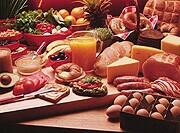Both animal and plant sources are important
WEDNESDAY, June 10, 2015 (HealthDay News) — Older adults need a protein-rich diet to maintain lower body muscle mass and strength, a new study suggests, and different types of protein may have differing effects. Findings from the study, funded by the U.S. National Institutes of Health, were published online May 27 in the Journal of Nutrition.
Shivani Sahni, Ph.D., of the Hebrew SeniorLife Institute for Aging Research in Boston, and colleagues collected data on 2,675 men and women who took part in the Framingham Offspring Cohort study. Participants — average age 60 — had their protein consumption, leg lean muscle mass, and quadriceps strength measured at various times between 1998 and 2001.
The researchers found that lean muscle mass was highest among those who ate the most total protein and the most animal protein. Plant protein — such as nuts and beans — was not associated with lean mass in men or women, the researchers noted. But those who ate the most protein from plants had greater quadriceps strength, compared with those who ate the least plant protein.
“Dietary protein types may differentially affect muscle mass and strength,” the authors write. “Whether [plant protein] is a marker of dietary quality or has direct effect on muscle strength (independent of lean mass) needs to be further clarified.”
Copyright © 2015 HealthDay. All rights reserved.








